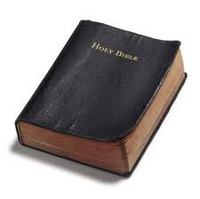Last week, I wrote a post, “What
is the Bible?” In it, I argued that the Bible is “both the work of human beings
and the Word of God.” And I asked, “if it isn’t merely a culturally constructed
and deeply flawed human project, and if it isn’t God via dictation, what is
it?” One reader brought up the good point that it is easy enough to demonstrate
that the Bible isn’t God via dictation. It’s a harder task to “prove” that the
Bible isn’t merely a culturally constructed and deeply flawed human project. I
believe that the Bible is the authoritative Word of God for a variety of
reasons: the consistency of the story that a variety of writers tell about
God’s character (again, see last week’s post) as revealed in Jesus Christ, the
integrity of the texts themselves when they are read according to their own
rules (more on this to come), the practice of the community of faith in
compiling this particular set of books (today’s post), and the power that this
Word has had in my own life (that part comes later too). So stay tuned for more
thoughts, but for now: who decided what books go in the Bible? And why does it
matter?
The word scholars use to
refer to the 66 books in the Bible is “canonical.” Other Christian and Jewish
literature, like The Gospel of Thomas,
or The Shepherd of Herma, or even an encyclical
by a Pope, is not canonical. The word canonical comes from the word “canon.” “Canon”
originally referred to a literal measuring stick, and it came to describe the
books that serve as the measuring stick for the Christian faith. The dictionary
defines it as “an authoritative list of books accepted as Holy Scripture.”
So how and who and when did
we decide which books were canonical and which weren’t?
In general terms, it took a long time and a lot of debate. When Paul wrote his letter to the Corinthians, for example, it was not automatically put next to his letter to the Philippians and called Scripture. In fact, all 27 books of the New Testament were not agreed upon as “canonical” for quite a few centuries. When I first understood that the authors of these books didn’t know they were writing Scripture when they wrote it, and that it took arguments and many years to decide what was Scripture and what wasn’t–I was a little thrown off. I wondered whether his process of canonization was merely a matter of church politics. Certainly, the formation of the canon was a historical, social, political and literary process. But at the same time, Christians believe that God works through human beings, that God, in fact, is humble enough to be willing to work through human beings. The ultimate example of God’s humility comes in the person of Jesus, but it also comes in God working through a community of people over time to establish the canon.
I think it might be helpful to consider how other pieces of literature are “canonized” within our contemporary culture. It takes time for our communities to recognize that a book or a poem or a speech both reflects the culture in which and for which it was written while simultaneously having lasting value for today’s readers. Let’s take the Gettysburg Address. Abraham Lincoln did not set out to write a speech that would be memorized by school children in 2010. In fact, he wrote a short speech that was denigrated by many of his contemporaries. Over time, however, historians and lay people alike recognized that Lincoln’s speech captured something true, valuable, and important about American culture at that time and going forward. No committee ever met to decide that the Gettysburg Address was important. But cultural consensus ensured that it would make it into history textbooks for years to come. A similar process occurred with the canon of Scripture. The community recognized the texts that had formed them over time, and recognized that they were the word of the Lord both at the time they were given and for generations to come.
Over the course of time, certain documents–narratives, poetry, letters, and so forth–were deemed “Scriptural,” that is, they were set apart as “God’s Word,” by the community of people who used them. This was true first among the Jews and later among the Christians. Over time, certain letters and stories came to be seen as God’s authoritative word because they both provided a truthful and consistent witness to God’s work in the world and they helped the community of believers to understand that work. In other words, on a general level, the books that we now know as Scripture reflect that big picture story of God’s redemptive work within the world (see last week’s post).
Stay tuned: next week’s Tuesday posts will address the formation of the Old and New Testament canons respectively.


